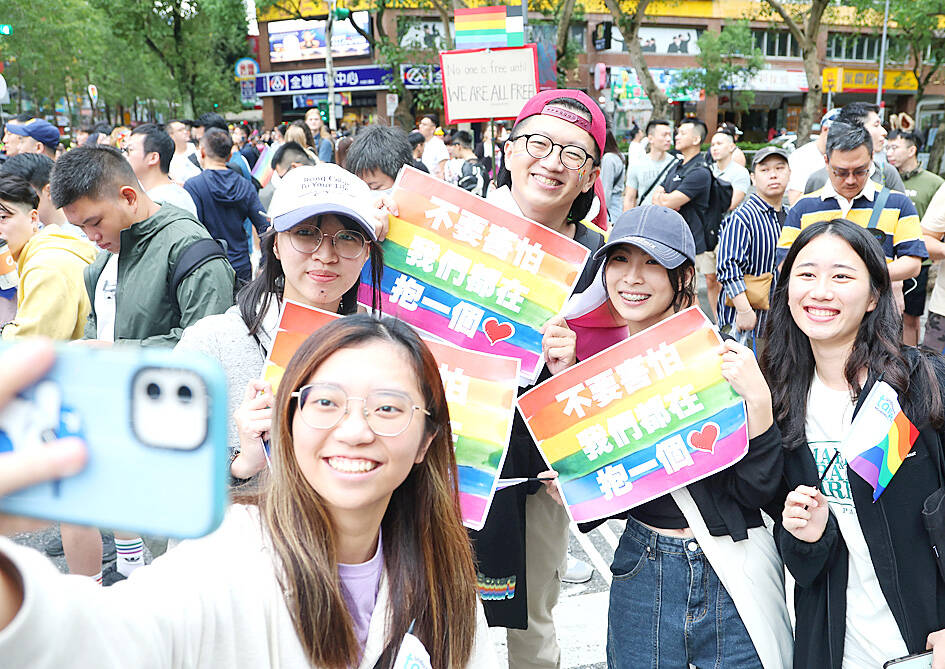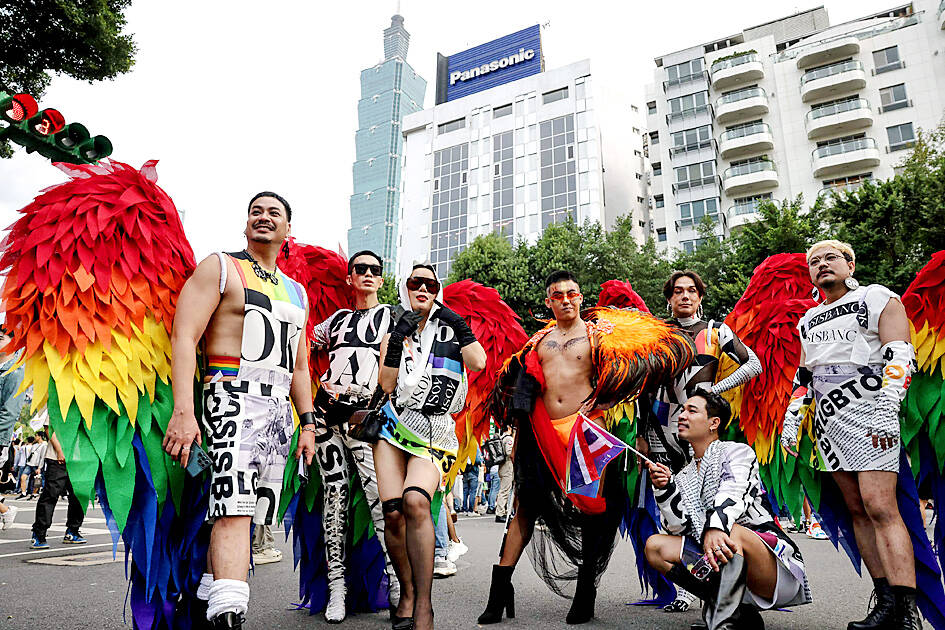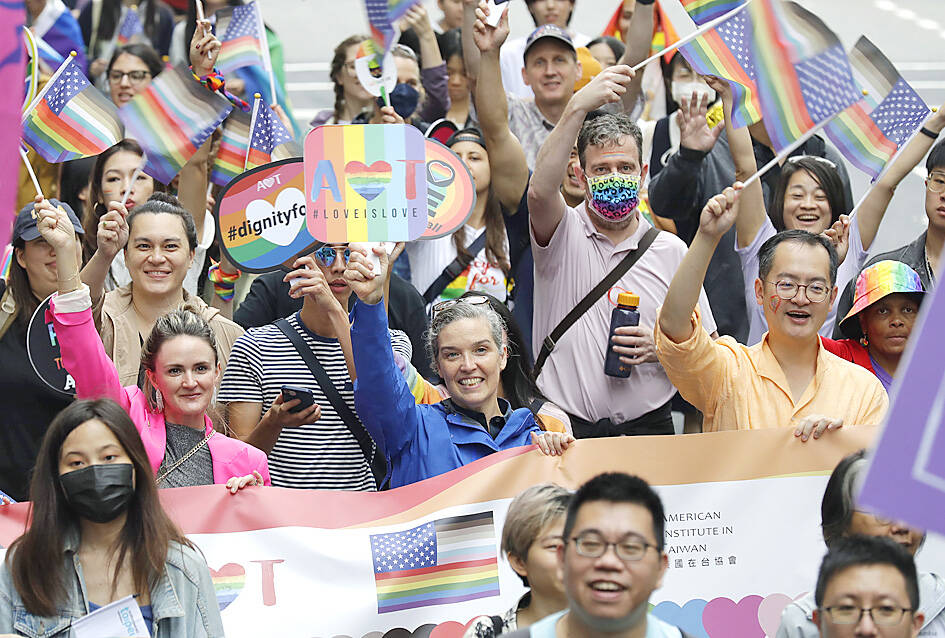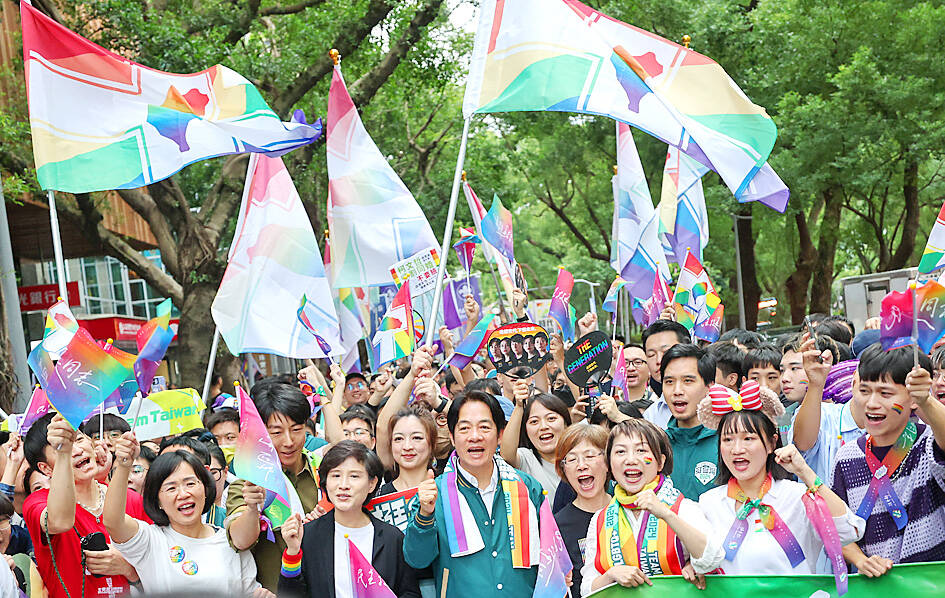A large crowd, many waving rainbow flags, yesterday marched through Taipei in a riotous celebration of LGBTQ+ equality and diversity in East Asia’s largest Pride march.
This year’s parade, 2023 Taiwan LGBT+ Pride, was aimed at “recognizing the diversity of every person, and respecting and accepting different gender identities,” said the Taiwan Rainbow Civil Association, the event’s organizer.
It was a theme that resonated with the participants, including a number from parts of Asia where diversity is not well understood and their communities are not able to express themselves freely.

Photo: CNA
The association estimated that 176,000 people joined the march, while police said the attendance was higher than at the last parade, which drew a crowd of 120,000.
Regardless of the number of participants, they packed the streets of central Taipei, with some coming from outside of Asia, including Jean-Luc Romero-Michel, deputy mayor of Paris in charge of human rights, who is openly gay.
Among the groups and organizations in attendance were the Tong-Kwang Light House Presbyterian Church and American Chamber of Commerce in Taiwan, as well as a delegation headed by American Institute in Taiwan Director Sandra Oudkirk.

Photo: Cheng I-hwa, AFP
The Democratic Progressive Party (DPP) was led by Vice President William Lai (賴清德).
Lai thanked those who had worked to support equality and the legalization of same-sex marriage in 2019 as scantily clad male dancers passed behind him on the back of a truck.
“Equal marriage is not the end — it’s the starting point for diversity. I will stand steadfast on this,” said Lai, who is also the DPP’s presidential candidate in January’s election.

Photo: Chiang Ying-ying, AP
Wu Yi-hsuan (吳怡萱), campaign spokesperson for Taiwan People’s Party (TPP) Chairman and presidential candidate Ko Wen-je (柯文哲), said that while Ko was not able to attend due to scheduling conflicts, other TPP officials, including herself and TPP Deputy Secretary-General Osmar Hsu (許甫), were on site to show the party’s support.
New Taipei City Mayor Hou You-yi (侯友宜), the Chinese Nationalist Party’s (KMT) presidential candidate, did not attend the event, but the KMT’s youth wing did, with its members shouting that their party also supported equality as they passed by Lai.
Several other activities were held in conjunction with the march, including a Rainbow Market with 120 booths, the most in Taiwan Pride history, drag performances and a “Color Diversity” coloring station where people could express what diversity meant to them.

Photo: CNA
The association said the annual event has a broader role beyond diversity, expressing a more expansive vision for the future of the LGBT+ community.
“With gender issues still in need of continuous attention and advocacy,” Taiwan LGBT+ Pride strives to “be an avenue to celebrate a life that is true and free, a life without discrimination, stigmas and violence,” the association said.

MORE VISITORS: The Tourism Administration said that it is seeing positive prospects in its efforts to expand the tourism market in North America and Europe Taiwan has been ranked as the cheapest place in the world to travel to this year, based on a list recommended by NerdWallet. The San Francisco-based personal finance company said that Taiwan topped the list of 16 nations it chose for budget travelers because US tourists do not need visas and travelers can easily have a good meal for less than US$10. A bus ride in Taipei costs just under US$0.50, while subway rides start at US$0.60, the firm said, adding that public transportation in Taiwan is easy to navigate. The firm also called Taiwan a “food lover’s paradise,” citing inexpensive breakfast stalls

TRADE: A mandatory declaration of origin for manufactured goods bound for the US is to take effect on May 7 to block China from exploiting Taiwan’s trade channels All products manufactured in Taiwan and exported to the US must include a signed declaration of origin starting on May 7, the Bureau of Foreign Trade announced yesterday. US President Donald Trump on April 2 imposed a 32 percent tariff on imports from Taiwan, but one week later announced a 90-day pause on its implementation. However, a universal 10 percent tariff was immediately applied to most imports from around the world. On April 12, the Trump administration further exempted computers, smartphones and semiconductors from the new tariffs. In response, President William Lai’s (賴清德) administration has introduced a series of countermeasures to support affected

CROSS-STRAIT: The vast majority of Taiwanese support maintaining the ‘status quo,’ while concern is rising about Beijing’s influence operations More than eight out of 10 Taiwanese reject Beijing’s “one country, two systems” framework for cross-strait relations, according to a survey released by the Mainland Affairs Council (MAC) on Thursday. The MAC’s latest quarterly survey found that 84.4 percent of respondents opposed Beijing’s “one country, two systems” formula for handling cross-strait relations — a figure consistent with past polling. Over the past three years, opposition to the framework has remained high, ranging from a low of 83.6 percent in April 2023 to a peak of 89.6 percent in April last year. In the most recent poll, 82.5 percent also rejected China’s

PLUGGING HOLES: The amendments would bring the legislation in line with systems found in other countries such as Japan and the US, Legislator Chen Kuan-ting said Democratic Progressive Party (DPP) Legislator Chen Kuan-ting (陳冠廷) has proposed amending national security legislation amid a spate of espionage cases. Potential gaps in security vetting procedures for personnel with access to sensitive information prompted him to propose the amendments, which would introduce changes to Article 14 of the Classified National Security Information Protection Act (國家機密保護法), Chen said yesterday. The proposal, which aims to enhance interagency vetting procedures and reduce the risk of classified information leaks, would establish a comprehensive security clearance system in Taiwan, he said. The amendment would require character and loyalty checks for civil servants and intelligence personnel prior to